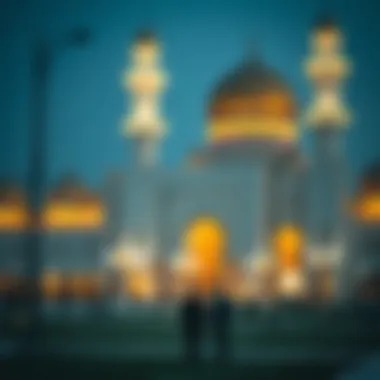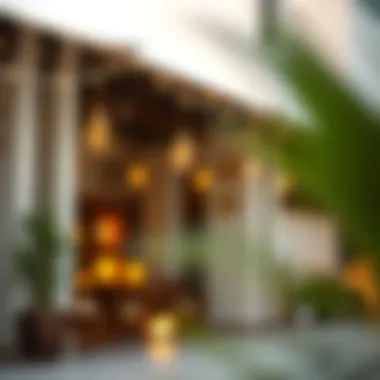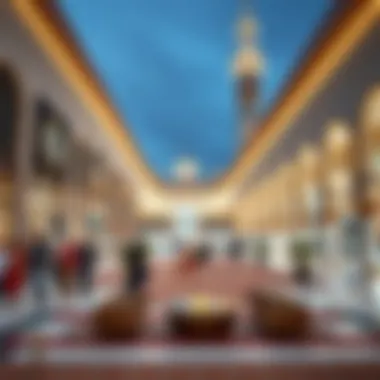Eid Holiday 2023 in the UAE: A Comprehensive Guide


Intro
The Eid holiday, a time of joy and reflection, evokes a myriad of cultural practices and festive celebrations across the United Arab Emirates. This year, 2023, presents a unique perspective as it intertwines tradition with the current socio-economic climate of the region. As expatriates, potential homeowners, and investors gear up to embrace the festivities, understanding the implications of Eid on various sectors, such as tourism and real estate, becomes paramount.
Eid signifies a moment for families and communities to come together, honoring age-old customs while inviting contemporary influences. Ranging from intricate prayer ceremonies to bustling market days filled with local delicacies, the cultural richness of Eid offers a glimpse into the heart of Emirati life. Additionally, the government's involvement in these celebrations shapes both community dynamics and market trends, making it essential to delve deep into the subject.
In this article, we will explore the intricacies of the Eid holiday in the UAE for 2023, analyzing its historical significance while providing insights into its effects on the property market and tourism. We will outline community events that showcase the spirit of Eid and how these gatherings impact the local economy. With a balanced perspective, this piece aims to serve as a guide for anyone navigating through the vibrant landscape of the UAE during this festive season.
Foreword to Eid in the UAE
Eid in the UAE is much more than just a holiday; it serves as a cornerstone of cultural identity and social cohesion. The annual celebration signifies the culmination of the holy month of Ramadan, marking a time for reflection, gratitude, and community spirit. In the context of this article, understanding Eid is essential not just for those observing the traditions, but also for investors, homeowners, expatriates, and anyone connected to the diverse society of the UAE. The intricate blend of modernity and tradition makes Eid a unique experience that impacts various sectors, from tourism to real estate.
Cultural Significance
Eid al-Fitr, in particular, holds profound spiritual and cultural significance in the UAE. It is a time for families to come together, breaking bread after the month of fasting with lavish feasts and shared joy. The celebration epitomizes the values of generosity and compassion as people embrace the essence of giving; it is customary to provide for those less fortunate through acts of charity, often referred to as Zakat al-Fitr.
In many communities, you can witness the vibrant decorations adorning homes, mosques, and public spaces. Bright lights and festive elements create a sense of excitement and anticipation. Undoubtedly, food plays a central role here as families prepare an array of traditional dishes, creating an inviting atmosphere filled with laughter and love.
"Eid brings not just families together, but communities, transcending cultural differences and uniting people in the spirit of joy."
Living in the UAE during Eid allows expatriates to absorb local customs, fostering deeper integration into the rich fabric of Emirati culture while also sharing their own traditions.
Historical Context
The historical roots of Eid in the UAE can be traced back to the Islamic faith, steeped in traditions that date back to the Prophet Muhammad's time. Eid celebrates not just the end of Ramadan but also symbolizes a fresh start, a new chapter in the lives of individuals. In the earlier days, Eid festivities included communal prayers at mosques, a practice that continues vigorously today with residents gathering to perform the special Eid prayer, and listen to sermons that emphasize brotherhood and charity.
Over the years, the observance of Eid has evolved, yet it remains deeply intertwined with the societal norms and collective memory of the UAE's people. In recent decades, modernization has influenced how Eid is celebrated, intertwining traditional practices with contemporary expressions of culture. This evolution underscores the UAE's unique balance between embracing its rich heritage while adapting to a rapidly changing global environment. As we move through the evolving dynamics of Eid in 2023, understanding these historical nuances enhances one's appreciation for this cherished holiday.
Eid Holiday Dates in
Eid celebrations carry significant importance within the UAE, both culturally and economically. Understanding the specific dates for Eid in 2023 is crucial not only for Muslims observing the holiday but also for businesses, investors, and expatriates wanting to engage with the festivities. The anticipation surrounding these dates shapes planning, both for personal celebrations and business operations, offering unique insights into the mixed tapestry of tradition and modernity that characterizes the UAE.
Announcement from Authorities
Eid holiday dates traditionally hinge on the lunar calendar, specifically the sighting of the moon. In the UAE, this announcement is made by the authorities, often resulting in a wave of excitement across the nation. In 2023, the announcement is typically made close to the end of Ramadan, which adds an element of suspense as families and businesses prepare for one of the most cherished holidays.
For this year, it is expected that the official announcement will be made by the UAE's Moon Sighting Committee. As is customary, the announcement will confirm the date for Eid al-Fitr, signaling the end of fasting and the beginning of celebrations. These periodical official announcements play vital roles in shaping communal activities and initiating community bonding every year.
"The moment the moon is sighted, the air is filled with joy and anticipation, signaling the start of festivities that unite families and communities."
Community vibrancy is crucial, as it leads to heightened participation in local events, markets, and religious observances. Understanding when these official pronouncements will be made offers strategic advantages for planning. Businesses in the hospitality sector, retail, and tourism can significantly benefit from this knowledge, tailoring their offerings to coincide with peak holiday times.
Expected Days of Celebration
For 2023, Eid al-Fitr is projected to fall on a Friday, 21st April, marking a day when individuals come together for prayers, festive meals, and exchanging gifts. The holiday typically grants a long weekend for many, spanning several days, with official holidays often declared by the government extending through the weekend.
During the anticipated period, from 21st April to 23rd April, communities engage in various activities that embody the essence of Eid.
Highlights of the celebrations include:
- Family Gatherings: Families come together, offering support and solidarity, reinforcing crucial bonds.
- Public Celebrations: Local parks and malls become buzz with various events designed to entertain and engage the community.
- Charity Events: A significant aspect of Eid involves sharing one's blessings, with many opting to donate to those less fortunate, strengthening community ties and compassion.
- Culinary Feasts: Special meals are prepared to honor the occasion, showcasing diverse cultural backgrounds of the UAE’s residents and enriching the gastronomy experience.
As the holiday approaches, understanding the expected days of celebration can aid individuals, businesses, and expatriates in organizing, navigating, and immersing themselves fully into the festive spirit that defines Eid in the UAE.
Eid Celebrations in the UAE
Eid celebrations in the UAE play an essential role in the cultural fabric of the nation. These festivities bring families and communities together, creating a spirit of unity and joy. They offer an opportunity for individuals to reflect on their faith as well as share meaningful moments with loved ones. The significance of Eid extends beyond mere religious observance, impacting social dynamics, local economies, and even tourism. In 2023, these celebrations promise to be more vibrant than ever, marking a time of renewal and hope.
Traditions and Customs
Traditions and customs are at the heart of Eid celebrations in the UAE. People engage in a variety of practices that highlight their rich heritage and foster a sense of belonging. One of the most notable customs involves gathering for special prayers, typically held in large open areas or mosques. The community spirit is palpable during these gatherings, as men, women, and children don their finest clothes, often traditional attire, reflecting their pride in their culture.
Exchanging Eid greetings, such as "Eid Mubarak", is a significant aspect of the day, reinforcing community ties. Families prepare special meals and sweets, which are shared with relatives and neighbors. Another cherished custom is the act of giving Zakat al-Fitr, a charitable donation to support those less fortunate, ensuring that everyone can celebrate amid the festivities.


In addition to these practices, entertainment plays a vital role. Various events, from cultural fairs to live music, are organized to enhance the festive atmosphere, making Eid a truly meaningful experience for all participants.
Community Events
Community events during Eid in the UAE reflect the spirit of togetherness and celebration. These gatherings serve not only as a means of festivity but also as a platform for building community cohesion.
Festivals and Fireworks
One of the highlights of Eid celebrations is the spectacular fireworks displays often held across major cities like Dubai and Abu Dhabi. These colorful showcases symbolize joy and unity, drawing crowds from various backgrounds, reinforcing the multicultural aspect of the UAE. The key characteristic of these fireworks is their grandeur; the shows last for several minutes, lighting up the night sky in vibrant colors, much like the diverse population that enjoys them.
These fireworks serve more than just a visual spectacle; they play a role in fostering a festive atmosphere, filling the air with excitement and wonder. The celebrations around them often include family-friendly festivals featuring live performances, food stalls, and various activities for children. Such events highlight the importance of community involvement and create lasting memories.
Charity Initiatives
Eid is also a time for giving back to the community through various charity initiatives. Many organizations and individuals participate in events aimed at helping those in need, exemplifying the true spirit of Eid. A notable characteristic of these initiatives is their inclusivity; they invite participation from all community members, transcending barriers of nationality and background.
The unique feature of these charity efforts during Eid is their emphasis on compassion. Many families engage in acts of kindness, whether by donating food, clothing, or money, reinforcing the significance of helping others. The advantages of such initiatives are manifold; they not only support those less fortunate but also strengthen community bonds as people come together for a common cause.
Cultural Performances
Cultural performances are another vibrant aspect of Eid celebrations in the UAE. These events showcase traditional music, dance, and art, enriching the cultural tapestry of the celebrations. Local artists often perform, allowing community members to connect with their cultural roots. This focus on cultural expression is a key characteristic of the celebrations; it highlights the UAE's dedication to preserving its heritage while promoting inclusivity.
The unique feature of these cultural performances during Eid lies in their ability to unite people through shared experiences. They offer a chance for attendees to engage deeply with their traditions, but also to appreciate the rich diversity present in the UAE. Often, these events foster a what’s more enriching dialogue among different cultures, lending to both educational and entertaining experiences.
In summary, the Eid celebrations in the UAE go far beyond mere festivities; they represent a collision of tradition, community spirit, and compassion, beautifully encapsulating the values that bind this diverse nation together. Each aspect, from traditions and customs to community events, plays a critical role in enhancing the overall experience, proving that the true essence of Eid lies in unity and joy.
Impact of Eid on Real Estate
The Eid holiday, particularly in a cosmopolitan setting like the UAE, serves as a major driving force for various sectors, not least the real estate market. With heightened consumer confidence and festive sentiments in the air, the dynamics of property purchases and rentals tend to shift significantly, presenting opportunities and challenges alike. Investors, homeowners, and expatriates should grasp the relationship between the festivities and the property market to make informed decisions, whether for investment or residence.
Market Dynamics
During the Eid holiday, various factors contribute to shaping the real estate landscape in the UAE. Notably, the influx of visitors and expatriates creates a vibrant demand for residential properties.
- Increased Rental Demand: As families flock to the UAE to celebrate with loved ones, the need for short-term accommodations sees a gradual rise. This demand often leads to a spike in rental prices, particularly in popular areas like Downtown Dubai and Abu Dhabi's Al Maryah Island.
- Spikes in Property Sales: Many developers launch attractive promotions during Eid, enticing potential buyers with limited-time offers or incentives. Those looking to invest often consider making purchases during this season, given the optimism that comes with the festive mood.
- Luxury Sector Boom: The high-net-worth individuals taking part in celebrations often seek upscale properties, thus driving a resurgence in the luxury real estate market. Agents should be prepared for inquiries regarding villas in exclusive communities like Emirates Hills and properties near iconic landmarks.
The upcoming holiday, while brimming with potential growth, also demands a calculated approach. Investors should evaluate trends in terms of market supply and demand to position themselves advantageously.
Investment Opportunities
Eid not only impacts the dynamics of the real estate market but also unveils attractive investment opportunities. This is particularly relevant for those in the UAE looking to dive into long-term asset growth.
- Residential Properties: With families and expatriates seeking information about areas that come alive during Eid, investing in residential properties can yield high returns. Streets flooded with celebrations, vibrant markets, and cultural performances make neighborhoods more desirable.
- Commercial Spaces: Retail environments also enjoy a spike in activity during Eid, as people indulge in shopping. Purchasing commercial spaces can be a lucrative venture. Areas like Dubai Mall and The Dubai Fountain see increased footfall, thus boosting opportunities for businesses serving holiday-specific consumers.
- Collaborations with Developers: Engaging with property developers for projects that cater to the festive spirit can be beneficial. Investing in properties that align with community events or cultural experiences have a way of enhancing appeal.
The vitality of Eid influences the psychology of buyers and renters in the UAE, creating an environment ripe for strategic investments.
Eid from the Expat Perspective
Eid holds a special charm not just for locals but also for expatriates living in the UAE. As they navigate their lives in a foreign land, the holiday presents an opportunity to engage with local customs and strengthen community ties. It is a time when cultural barriers fade a little, allowing expats to immerse themselves in the joyful atmosphere surrounding the celebrations. Understanding the significance of Eid from this angle enriches their experience and promotes cultural awareness.
Experiences of Expats
For many expatriates, Eid is more than a holiday. It is a cultural adventure, a chance to witness unique traditions that may differ significantly from their home countries. Many newcomers find themselves intrigued by the beautiful practices during Eid, such as the communal prayers held in large mosques like Al-Masjid Al-Haram in Abu Dhabi or the grand festive meals with neighbors. Here, families come together to share traditional dishes and sweets, like the famous Kleicha or Ma'amoul.
The ambience during Eid is often festive; shopping malls and local markets in Dubai and Abu Dhabi are buzzing with activities. Expats often take part in shopping sprees, finding gifts for friends and family, a common practice during this festive time. Many report feeling a sense of belonging and warmth as they are welcomed into local households to partake in celebrations. It is a heartwarming experience that can make one feel at home, even in unfamiliar circumstances.
"Eid brings everyone together. I never felt so at home miles away from my family back in India; it's truly special." — An expat from India sharing her feelings about Eid in the UAE.
Community Integration
The significance of Eid for expatriates transcends personal experiences; it also fosters a sense of community integration. Eid acts as a bridge for expats to connect with Emirati neighbors and other nationalities, enhancing multicultural interactions. Instead of being mere observers, many expats actively participate in events and programs organized across communities and cities.
In the UAE, residents commonly engage in seasonal events, such as charity initiatives that align with the spirit of giving inherent in Eid celebrations. Programs like


- Eid Fit Festival
- Iftar and Suhoor Gatherings
- Art Exhibitions
These activities encourage participation, allowing expats to mix with locals and promote understanding and respect between cultures. Additionally, expats often find themselves invited to join local groups or online forums, such as those found on Facebook or Reddit, where they can share experiences and gain insights from long-term residents.
Ultimately, the Eid festivities open doors for expatriates to actively contribute to the cultural fabric of the UAE, reinforcing the idea that community and celebration know no borders.
Tourism During Eid Holidays
Tourism during the Eid holidays in the UAE holds a significant place, especially as it showcases how deeply intertwined cultural festivities and global travel can be. This period not only enhances the vibrancy of local communities but also serves as an economic lynchpin that attracts both international tourists and local residents. The influx of visitors during Eid often sets a bustling backdrop for celebrations, impacting various sectors—including retail, hospitality, and entertainment—while allowing investors and homeowners to seize opportunities born from increased demand.
The technical dance of arranging for enhanced travel accommodations and festive events is nothing short of awe-inspiring. Tourists flock to Dubai, Abu Dhabi, and other emirates not only to partake in religious observances but also to indulge in the unique offerings of the region. The importance of this element cannot be overstated, as it signals a vibrant revival of the tourism sector post-pandemic and showcases the resilience of the UAE in attracting global travelers.
Increased Tourist Traffic
Every Eid, particularly Eid al-Fitr, catalyzes a spike in tourist traffic that cities in the UAE relish. Airlines ramp up their schedules, hotels brace for full occupancy, and attractions gear up for an unprecedented wave of visitors.
- Booking Trends: Many travelers plan their trips months in advance, and data suggests that hotel bookings soar to nearly full capacity weeks before the holiday.
- Travel Promotions: Airlines often launch promotions unique to this season, enticing a broader audience. This confluence of travel trends can be notably beneficial for local businesses as well.
- Multicultural Atmosphere: The diversity of visitors creates a rich tapestry of experiences and cultural exchanges, making the holiday even more memorable.
As a noteworthy point, the UAE government actively supports this influx of tourism through various initiatives designed to improve safety, hospitality standards, and cultural relevance to ensure a rich experience for visitors. Integrating religious practices with local customs allows for a unique experience unmatched in other destinations. Tourists experience a warm welcome, often participating in traditions such as attending prayer gatherings or enjoying local sweet delicacies, like maamoul, made especially for the occasion.
Influence on Hospitality Sector
The hospitality sector experiences a distinct uplift during the Eid holidays, catalyzing not just hotel stays but also dining and entertainment avenues. The arrival of a flood of tourists presents a golden opportunity for local hotels and restaurants to enhance their offerings.
- Increased Occupancy Rates: Hotels report peak periods with occupancy rates jumping significantly, often exceeding 85% during Eid. Some luxury resorts even capitalize on this with exclusive packages includes spa treatments or gourmet dining experiences.
- Culinary Events: Restaurants and hotels spotlight festive menus featuring traditional Eid dishes, offering culinary delights that draw in both tourists and local families looking to celebrate together.
- Special Offers and Events: Establishments often craft events, like Eid brunches or themed parties infused with traditional music and dance, which attract not just tourists but Emirati families as well.
This bustling atmosphere is vital for maintaining a competitive edge in tourism. As the hospitality and tourism sectors continue to evolve, efforts to create memorable experiences remain at the forefront of business practices.
"Eid holidays represent a unique avenue where ancient customs blend seamlessly with modern tourist demands, creating an exhilarating experience for all."
The convergence of increased tourist traffic and an energized hospitality sector underscores the larger narrative of Eid holidays as pivotal moments that shape the tourism landscape in the UAE. For investors and homeowners, these developments signal a sea change in opportunities, further entrenching the belief that holidays like Eid are not merely dates on a calendar but significant economic catalysts.
Culinary Traditions During Eid
Culinary traditions during Eid are not just about good food; they encapsulate the essence of togetherness, celebration, and generosity. In the UAE, these traditions take on a special flavor, marrying local customs with global influences due to the country’s rich tapestry of cultures. Preparing and sharing meals during Eid strengthens bonds among family and friends, serving as a focal point for gatherings.
The act of preparing meals during Eid is steeped in ritual, often announced well in advance. Families will typically begin preparations days before the holiday. This process isn't just about cooking; it embodies the spirit of Eid, where each dish tells a story. For expatriates, participating in these culinary traditions can also lead to deeper community ties, making them feel more connected to their new home.
Festive Meal Preparations
During Eid, meal preparations can begin at dawn. Women and men, young and old, often pitch in, creating an atmosphere that’s buzzing with excitement. Shops and markets overflow with vibrant ingredients, from fragrant spices to fresh produce. Home kitchens often become hubs of activity, filled with laughter and chatter, while the aroma of traditional spices wafts through the air.
Key elements of festive meal preparations include:
- Planning the Menu: Families often curate a menu that features dishes passed down through generations, infused with personal touches.
- Shopping for Ingredients: Markets are a sensory delight during Eid. Riveting conversations occur while sourcing the freshest ingredients; it's a tradition in itself.
- Joining Forces: In true communal spirit, neighbors and friends often exchange recipes and ingredients, sharing the culinary load while strengthening social bonds.
This sense of togetherness is what makes the meal preparations significant. They breathe life into the holiday, fostering a sense of unity and joy.
Popular Dishes
When it comes to popular dishes served during Eid, the list is extensive and diverse. Each dish embodies cultural significance and brings a unique flavor to the table. Commonly found dishes include:
- Luqaimat: These delicious sweet dumplings, drizzled with date syrup and sprinkled with sesame seeds, are often a favorite for both young and old. They symbolize sweetness and joy, essential elements of any Eid celebration.
- Mandi: A mouthwatering rice dish cooked with basmati rice, marinated chicken or lamb, and a blend of spices. Mandi is often prepared in large quantities, making it perfect for gatherings. The ingredients vary slightly, showcasing the local twist on a traditional favorite.
- Samboosa: These savory pastries are often filled with spiced meat, paneer, or vegetables. Samboosa are omnipresent at Eid festivities, representing hospitality as they are served to guests.
- Harees: A traditional dish made from wheat and meat, harees is simmered slowly to meld flavors. It resonates deeply with cultural roots, often prepared to bring people together during the holiday.
In many households, the meal isn’t complete without an array of sweets and desserts that tantalize the palate. The importance of these dishes extends beyond flavor; they are essential to the social fabric of Eid, acting as a bridge between old and new generations.
"Sharing meals during Eid is a way to share love and create memories that last a lifetime. Each bite is a tapestry of flavors shared among friends and family."
In summary, the culinary traditions surrounding Eid in the UAE reflect deep cultural values and social practices. They emphasize the importance of community and family, serving as a reminder that food goes beyond sustenance—it's a celebration of life.
Spiritual Aspects of Eid
The spiritual aspects of Eid embody the essence of the holiday, transcending its cultural and communal festivities. For Muslims, Eid is more than just a holiday; it’s a time for reflection, gratitude, and spiritual renewal. The celebration marks the culmination of Ramadan, the holy month of fasting, and serves as a reminder of the importance of devotion and unity in faith. This section takes a closer look at the spiritual dimensions that make Eid a profound experience for the community in the UAE and beyond.


Prayer and Reflection
At the heart of Eid is the act of prayer. On the morning of Eid, Muslims gather for the special Eid prayer, performed in congregation, often in grand mosques or open spaces. This prayer signifies the communal aspect of worship—an opportunity for individuals to come together as one, regardless of their individual differences.
The prayer is typically followed by a sermon (khutbah) where imams impart wisdom and emphasize themes of compassion, forgiveness, and community solidarity. This moment fosters a sense of belonging among worshippers, reminding everyone of their shared beliefs and values, especially in a diverse society like the UAE.
In addition to the collective prayer, personal reflection plays a vital role during this holy celebration. Many use this time to assess their spiritual growth, remind themselves of their commitments to faith and community, and engage with their inner selves. It’s an occasion that encourages individuals to think about their blessings, leading to a deeper gratitude towards life and the world around them.
"Eid is an expression of gratitude— it’s not just about celebrating, it’s about reflecting on what we have and how we can give back to others.”
Acts of Charity
Eid is profoundly linked to the concept of charity (Zakat al-Fitr), which emphasizes the importance of helping those in need. Before the Eid prayers begin, it is customary for Muslims to donate a specified amount, known as Zakat, to ensure that everyone in the community can partake in the festivities, regardless of their financial means.
This practice not only aids the less fortunate but also reinforces the idea that true joy is found in giving. The generosity displayed during Eid is a testament to the caring nature of the community in the UAE, where acts of charity abound. Community centers and mosques often host initiatives that allow people to donate food, clothing, and other essentials, ensuring that the spirit of Eid reaches even the remotest corners of society.
Here are some notable examples:
- Food Donations: Many families prepare extra meals to distribute among the less fortunate during Eid, strengthening community bonds.
- Clothing Drives: Numerous organizations take it upon themselves to collect clothes and distribute them to those in need, allowing everyone to celebrate Eid feeling dignified.
- Community Fundraisers: Events organized to raise money for charitable causes also spike during Eid, as more and more people commit to lifting the spirits of others.
The intertwining of prayer and charity during Eid not only enriches the individual’s spiritual practice but also nurtures a deeper sense of connection within the entire community. This mutual support makes Eid a time of joy, growth, and shared humanity across diverse backgrounds.
Potential for Economic Growth
The Eid holiday presents a unique opportunity for various sectors in the UAE economy, leading to potential growth. This period is not just a time for celebration; it serves as a catalyst for economic activity, fostering an environment ripe for development. Whether it's through increased consumer spending or tourism, the economic implications of this festive period are profound.
Retail and E-commerce Trends
During Eid, the retail landscape sees a noteworthy uptick in activity. Consumers are often on the hunt for gifts, clothing, and specialty foods to celebrate the occasion. Malls and shopping centers become bustling hubs, attracting families eager to enjoy the festivities. As a result, retailers often see profit margins swell considerably during this time, emphasizing the importance of strategic marketing campaigns that engage customers effectively.
Moreover, the growth of e-commerce during Eid cannot be overlooked. Many families prefer online shopping due to its convenience, efficiency, and variety on offer. E-commerce platforms observe spikes in traffic and sales, as platforms like Noon.com and Amazon.ae capitalize on this demand. Retailers can harness this trend by launching special promotions or exclusive deals tailored for the holiday, thus capturing a share of this lucrative market.
- Crafting Seasonal Offers: Retailers typically roll out exclusive Eid sales that can include discounts and bundle deals.
- Expanding Online Presence: Local businesses that enhance their e-commerce capabilities can tap into a broader customer base, offering both delivery and pickup options.
- Engaging Content Marketing: Creating festively engaging content on social media and websites can attract consumers looking for inspiration related to gift-giving and celebration.
Long-term Impacts on Investment
The investment landscape in the UAE also shifts during Eid, showcasing its long-term potential. The surge in economic activity tends to encourage both local and foreign investment. Real estate investors, in particular, may find opportunities arising from increased demand for commercial spaces during this vibrant period.
It’s not merely a seasonal boon; the positive momentum generated can have ripple effects in the months that follow. Companies often find it easier to attract investment during festive periods since economic indicators can look promising. Notably, positive consumer sentiments during Eid can lead to sustained spending trends, which creates a more favorable climate for long-term investment initiatives.
- Attracting Foreign Direct Investment: The increased economic activity can convince foreign investors of the market’s resilience, prompting them to invest in various sectors.
- Sustained Job Creation: As businesses thrive during and after Eid, the demand for labor often increases, leading to more job opportunities.
- Infrastructure Development: Investments in infrastructure can gain traction as governments and private entities look to enhance facilities to accommodate the heightened activity, further stimulating economic growth.
"Eid not only promotes cultural unity but also emerges as a powerful driver for economic resurgence in the UAE, unveiling fresh avenues for investment and development."
In summary, the potential for economic growth during the Eid holiday is a compelling aspect that significantly influences various sectors, particularly retail and investment. Acknowledging these dynamics can help stakeholders from investors to businesses maximize opportunities while contributing to the overall vibrancy of the UAE economy.
Finale
The significance of understanding the Eid holiday in the UAE extends far beyond the festive atmosphere and public celebrations. Throughout this article, we have navigated through the multi-faceted layers of Eid, revealing how this pivotal time not only fosters community spirit but also has far-reaching impacts on various sectors, including real estate, tourism, and the economy at large.
Eid serves as a catalyst for cultural exchange and economic interaction within the UAE, making it imperative for stakeholders—be they investors, homeowners, expatriates, agents, or developers—to grasp its implications fully. The essence of these celebrations transcends the simple act of communal prayer or feasting; they are intertwined with significant economic prospects and community integration.
"Understanding the patterns and dynamics of Eid provides a window into the UAE's culture and economy, enhancing the potential for informed decision-making among those involved in local markets."
This holiday prompts an uptick in retail sales and tourism, with opportunities for growth in hospitality and related services. By being cognizant of the shifts that occur during Eid, investors can better position themselves to capitalize on heightened consumer activity. Moreover, for expatriates, recognizing the cultural weight of Eid can facilitate smoother integration into the UAE’s social fabric, leading to enriched experiences both personally and professionally.
Ultimately, this comprehensive guide serves to illuminate how Eid shapes not only the societal landscape but opens avenues for future investment and community growth. Grasping these insights ensures that stakeholders are not just participants but informed players in the ongoing development of the UAE's vibrant economy.
Recap of Key Points
- Cultural Significance: Eid embodies the rich traditions and customs specific to the UAE, highlighting the interplay of spirituality and community.
- Economic Impact: Through heightened celebration-related activities, Eid stimulates sectors like retail and tourism, suggesting a beneficial cycle for investment opportunities.
- Expat Experience: Understanding local practices enriches the expatriate experience, promoting integration and community bonds.
- Future Prospects: The holiday serves as an indicator for emerging trends and economic forecasts that can be pivotal for market strategies.
Future Implications
Looking ahead, the implications of Eid in the UAE cannot be overstated. Continued investment in Eid-related initiatives can bolster community development and enhance the cultural narrative for both locals and expatriates. As the UAE positions itself on the global economic stage, recognizing the holiday's role in fostering cultural appreciation and economic viability will be crucial.
Real estate developers, for example, can tailor their offerings to incorporate celebratory aspects that resonate with the community's values, creating vibrant living spaces that cater to festive gatherings.
Furthermore, as tourism continues to rise, aligning marketing strategies with Eid celebrations can attract international visitors eager to partake in the local festivities. This requires a dynamic approach that blends tradition with modernity, ensuring that developments remain relevant.
For detailed information, you may refer to sources such as Britannica, Wikipedia, and various governmental resources that outline public announcements regarding such significant holidays.



